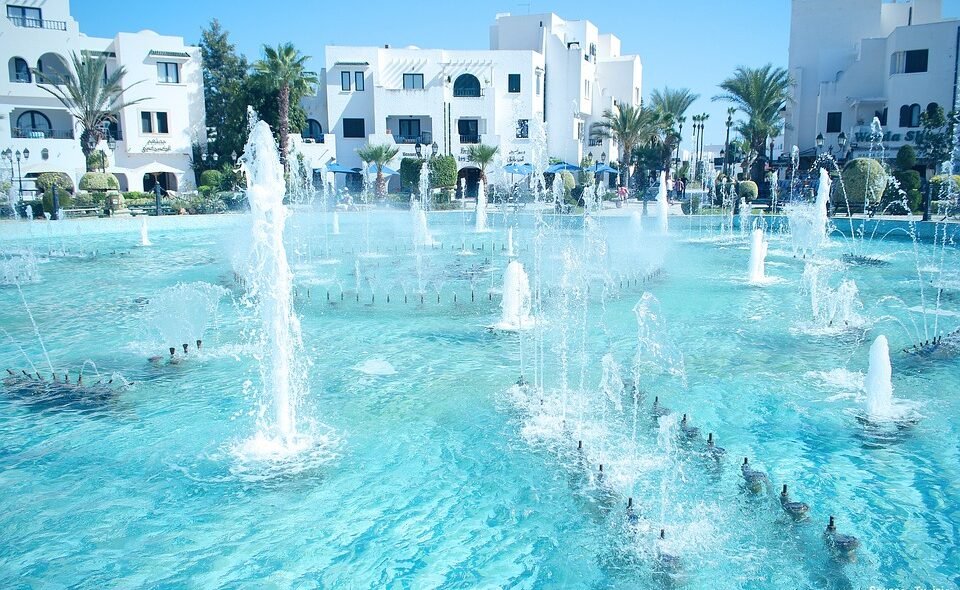| Topic | Information |
|———————————————|———————————————————————————————————–|
| Significance of Sousse in Tunisian history | – Rich history dating back to Phoenician times
– Important port city and trading hub for various empires
– UNESCO World Heritage Site
– Capital of the Aghlabid dynasty in the 9th century
– Great Mosque built in 851 |
| Must-visit attractions in Sousse | – Ribat of Sousse
– Archaeological Museum of Sousse
– Sousse’s medina
– Great Mosque of Sousse
– Beaches of Sousse |
| Local cuisine in Sousse | – Tunisian cuisine influenced by Mediterranean, Arab, and French traditions
– Dishes include couscous, harissa, olive oil, seafood, and mint tea
– Popular sweets include makroud and baclava |
| Immersing in Tunisian culture in Sousse | – Explore the medina
– Attend music or dance performances
– Visit a local hammam
– Take guided tours of historic sites |
| Traditional crafts and souvenirs in Sousse | – Handwoven carpets and rugs
– Olive oil, spices, and harissa
– Hand-painted ceramics and pottery
– Jewelry made with beads, silver, or gold |
| Exploring the historic medina of Sousse | – Hire a local guide
– Start at Bab el-Jedid gate
– Visit souks, stalls, and shops
– Explore Great Mosque and Ribat of Sousse
– Sample local pastries and mint tea |
| Off-the-beaten-path attractions in Sousse | – Dar Essid Museum
– Dar Am Taieb art gallery
– Sousse Archaeological Park
– Day trip to surrounding villages and countryside |
| Best ways to get around Sousse | – Walking
– Taxis
– Renting a bike or scooter
– Public transportation (buses and louages) |
| Cultural events and festivals in Sousse | – International Festival of Sousse
– Ramadan celebrations
– Sousse International Film Festival
– Traditional music and dance performances |
| Day trips and excursions from Sousse | – Ancient city of Carthage
– Seaside town of Hammamet
– Ichkeul National Park
– Ancient city of Dougga |
| Supporting sustainable tourism in Sousse | – Stay in eco-friendly accommodations
– Use public transportation or biking
– Support local businesses and artisans
– Respect the natural environment and engage with local communities
– Volunteer or participate in sustainable tourism initiatives |
## Frequently Asked Questions
1. What is the significance of Sousse in Tunisian history?
Sousse has a rich history dating back to Phoenician times and served as an important port city and trading hub for various empires. It also became the capital of the Aghlabid dynasty in the 9th century and played a key role in the spread of Islam in North Africa.2. What are some must-visit attractions in Sousse?
Must-visit attractions in Sousse include the Ribat of Sousse, Archaeological Museum of Sousse, the historic medina, the Great Mosque of Sousse, and the beaches of Sousse.3. What is the local cuisine like in Sousse?
Tunisian cuisine in Sousse is a delicious blend of flavors influenced by Mediterranean, Arab, and French cooking traditions. Some popular dishes include couscous, harissa, olive oil, seafood, and mint tea.4. How can I best explore the historic medina of Sousse?
To explore the historic medina of Sousse, consider hiring a local guide to lead you through the maze-like streets. Start at the Bab el-Jedid gate, visit souks and stalls, explore the Great Mosque and Ribat of Sousse, and sample local pastries and mint tea.5. What are some off-the-beaten-path attractions in Sousse?
Off-the-beaten-path attractions in Sousse include the Dar Essid Museum, Dar Am Taieb art gallery, Sousse Archaeological Park, and day trips to surrounding villages and countryside.6. What are the best ways to get around Sousse?
The best ways to get around Sousse include walking, taking taxis, renting a bike or scooter, and using public transportation such as buses and louages.7. How can I support sustainable tourism in Sousse?
To support sustainable tourism in Sousse, consider staying in eco-friendly accommodations, using public transportation or biking, supporting local businesses and artisans, respecting the natural environment, and engaging with local communities responsibly.Exploring the Rich History and Culture of Sousse, Tunisia
What is the significance of Sousse in Tunisian history?
Sousse, located on the coast of Tunisia, has a rich history dating back to Phoenician times. It was an important port city and trading hub for various empires, including the Roman, Byzantine, and Ottoman empires. The city’s historic medina is a UNESCO World Heritage Site, showcasing its importance throughout the centuries.
In the 9th century, Sousse became the capital of the Aghlabid dynasty and played a key role in the spread of Islam in North Africa. The city’s Great Mosque, built in 851, is a stunning example of early Islamic architecture and serves as a symbol of Sousse’s cultural and religious significance.
Throughout its history, Sousse has faced numerous invasions and sieges, including attacks by the Normans and Crusaders. These conflicts have left behind a wealth of historical sites and monuments that attract visitors from around the world to explore the city’s past.
What are some must-visit attractions in Sousse?
When visiting Sousse, there are several must-see attractions that showcase the city’s rich history and culture. The Ribat of Sousse, a fortress and monastery dating back to the 8th century, offers stunning views of the city and the Mediterranean Sea. The Archaeological Museum of Sousse houses a collection of Roman and Byzantine artifacts, providing insight into the city’s ancient past.
For a glimpse into Sousse’s traditional way of life, a visit to the medina is a must. The narrow streets are lined with shops selling local handicrafts, textiles, and pottery. The Great Mosque of Sousse, with its beautiful courtyard and minaret, is also worth exploring for its architectural beauty and historical significance.
For a relaxing day by the sea, the beaches of Sousse offer a chance to soak up the sun and enjoy the crystal-clear waters of the Mediterranean. With plenty of beachfront cafes and restaurants, visitors can also indulge in fresh seafood and Tunisian cuisine while taking in the stunning coastal views.
What is the local cuisine like in Sousse?
Tunisian cuisine is a delicious blend of flavors influenced by Mediterranean, Arab, and French cooking traditions. In Sousse, visitors can sample a variety of local dishes that showcase the region’s culinary heritage.
One of the most popular dishes in Sousse is couscous, a staple in North African cuisine made from steamed semolina grains served with a savory stew of meat and vegetables. Harissa, a spicy chili paste, is a common condiment used to add a kick to many dishes, while olive oil, fresh herbs, and seafood are also key ingredients in local cooking.
For a sweet treat, be sure to try makroud, a pastry made with dates, nuts, and honey, or baclava, a flaky pastry filled with nuts and sweet syrup. Mint tea is a popular drink in Tunisia and is often served with sugar or pine nuts for added flavor.
What are the best ways to immerse yourself in Tunisian culture in Sousse?
There are several ways to immerse yourself in Tunisian culture while visiting Sousse. One of the best ways is to explore the city’s medina, where you can wander the maze-like streets, shop for traditional handicrafts, and sample local delicacies at street food stalls.
Attending a traditional music or dance performance is another great way to experience Tunisian culture firsthand. Whether it’s a lively performance of Malouf music or a spirited folk dance, you’ll be swept up in the rhythms and melodies that have been passed down through generations.
Visiting a local hammam, or public bathhouse, is a unique cultural experience that dates back to Roman times. Treat yourself to a traditional scrub and massage, and revel in the relaxing atmosphere of these communal spaces.
For a deeper understanding of Tunisian history and culture, consider taking a guided tour of the city’s historic sites and museums. Guides can provide valuable insights and stories that bring the past to life and help you appreciate the richness of Tunisia’s heritage.
What are some traditional crafts and souvenirs to buy in Sousse?
Sousse is known for its traditional crafts and souvenirs that make for unique and meaningful gifts to bring back home. Handwoven carpets and rugs are a popular souvenir, with intricate designs and vibrant colors that reflect Tunisia’s artistic heritage.
For a taste of Tunisian cuisine at home, pick up a bottle of locally produced olive oil or a tin of fragrant spices like cumin, coriander, and saffron. Harissa, the spicy chili paste, is also a popular condiment to take home and add to your own cooking.
Hand-painted ceramics and pottery are another specialty of Sousse, with beautiful plates, bowls, and vases featuring traditional Tunisian motifs and designs. These make for stylish and functional souvenirs that will remind you of your time in Sousse.
If you’re a fan of jewelry, look for pieces made with colorful beads, silver, or gold that showcase Tunisian craftsmanship and design. Local markets and shops in the medina offer a wide selection of handmade jewelry that makes for a special keepsake or gift for loved ones.
How can I best explore the historic medina of Sousse?
Exploring the historic medina of Sousse is a must-do when visiting the city, as it offers a glimpse into its rich cultural heritage and traditional way of life. To make the most of your visit, consider hiring a local guide who can lead you through the maze-like streets and share fascinating stories about the medina’s history.
Start your tour at the Bab el-Jedid gate, the main entrance to the medina, and make your way through the bustling souks and stalls selling everything from spices and textiles to handicrafts and jewelry. Don’t be afraid to haggle for the best prices and take your time exploring the hidden gems tucked away in the narrow alleyways.
Be sure to visit the Great Mosque of Sousse, located in the heart of the medina, and admire its stunning architecture and intricate mosaics. The adjacent Ribat of Sousse offers panoramic views of the city and a glimpse into its military history as a fortress and monastery.
As you wander the streets, stop by local cafes and bakeries to sample traditional Tunisian pastries, sweets, and mint tea. Take in the sights, sounds, and smells of the medina, and soak up the vibrant atmosphere of this historical and cultural hub.
What are some off-the-beaten-path attractions in Sousse?
While Sousse is known for its historic sites and bustling medina, there are also some off-the-beaten-path attractions that offer a unique perspective on the city and its surroundings. One hidden gem is the Dar Essid Museum, a beautifully restored mansion showcasing traditional Tunisian architecture and decor.
For a tranquil escape from the city center, head to the Dar Am Taieb, a former palace turned art gallery that houses a collection of contemporary Tunisian art and artifacts. The lush gardens and courtyards provide a peaceful setting to appreciate local creativity and craftsmanship.
Nature enthusiasts will enjoy a visit to the Sousse Archaeological Park, where you can explore ancient ruins and Roman amphitheaters surrounded by lush greenery. Take a leisurely stroll through the park and imagine what life was like in ancient times as you marvel at the well-preserved remnants of the past.
For a taste of rural Tunisian life, consider taking a day trip to the surrounding villages and countryside, where you can meet locals, sample traditional cuisine, and learn about traditional crafts like pottery and weaving. These authentic experiences offer a glimpse into the everyday life of Tunisians outside of the tourist hubs.
What are the best ways to get around Sousse?
Sousse is a relatively compact city that can easily be explored on foot, especially in the historic medina and beachfront areas. Walking allows you to take in the sights and sounds of the city at your own pace, and discover hidden gems that may not be accessible by car.
For longer journeys or trips outside of the city center, taxis are a convenient and affordable way to get around Sousse. Be sure to negotiate the fare before getting in the taxi, as meters are not always used, and agree on a price with the driver before setting off.
If you prefer a more adventurous mode of transportation, consider renting a bike or scooter to explore Sousse and its surroundings. This gives you the freedom to navigate narrow streets and off-the-beaten-path locations while enjoying the fresh air and scenic views along the way.
Public transportation in Sousse includes buses and louages, shared taxis that follow set routes around the city and surrounding areas. Louages are a budget-friendly option for longer distances and offer a chance to connect with locals and experience Tunisian daily life firsthand.
What are some cultural events and festivals in Sousse?
Sousse hosts a variety of cultural events and festivals throughout the year that showcase the city’s vibrant arts scene and rich heritage. One of the most popular events is the International Festival of Sousse, a celebration of music, dance, theater, and visual arts that attracts artists from around the world.
During the month of Ramadan, Sousse comes alive with special events, markets, and performances celebrating the holy month. Visitors can enjoy traditional music and dance shows, sample local cuisine at street food stalls, and participate in cultural events that offer a deeper understanding of Tunisian customs and traditions.
The Sousse International Film Festival is another highlight for cinema enthusiasts, featuring screenings of independent and international films, workshops, and discussions with filmmakers. It’s a great opportunity to discover emerging talent and explore diverse perspectives through the art of cinema.
Throughout the year, Sousse also hosts traditional music and dance performances, art exhibitions, and craft fairs that promote local talent and creativity. These events provide a unique opportunity to engage with Tunisian culture and connect with the vibrant community of artists and artisans in the city.
What are some day trips and excursions from Sousse?
Sousse is a great base for exploring the surrounding region and taking day trips to nearby attractions and destinations. One popular excursion is a visit to the ancient city of Carthage, located just a short drive from Sousse. Explore the ruins of this once-great civilization, including the Antonine Baths, Roman theaters, and the Carthage National Museum.
For a change of pace, head to the seaside town of Hammamet, known for its beautiful beaches, historic medina, and vibrant arts scene. Wander the cobblestone streets, browse local shops for handicrafts, and relax on the sandy shores of this charming coastal destination.
Nature lovers will enjoy a trip to the Ichkeul National Park, a UNESCO World Heritage Site that offers breathtaking views of wetlands, forests, and mountains. Birdwatchers can spot a variety of species in their natural habitats, while hikers can explore scenic trails and enjoy the tranquility of the park.
If you’re interested in history and archaeology, consider a day trip to the ancient city of Dougga, known for its well-preserved Roman ruins, including the Capitol, theater, and temples. A guided tour of this archaeological site provides insight into Tunisia’s classical past and the importance of Dougga as a cultural and political center.
How can I support sustainable tourism in Sousse?
Supporting sustainable tourism in Sousse involves making conscientious choices that minimize your impact on the environment and local community while maximizing the benefits of your visit. One way to do this is by staying in eco-friendly accommodations that have implemented green practices such as energy conservation, waste reduction, and water conservation.
When exploring Sousse, opt for public transportation, biking, or walking instead of taking private taxis or rental cars to reduce carbon emissions and traffic congestion. By supporting local businesses, artisans, and restaurants, you can contribute to the economic development of the community and help preserve traditional crafts and cultural heritage.
Respect the natural environment by avoiding activities that harm wildlife or damage ecosystems, such as littering, feeding wild animals, or disturbing nesting sites. Follow responsible tourism guidelines and regulations when visiting protected areas or historical sites to ensure their preservation for future generations to enjoy.
Engage with local communities in a respectful and culturally sensitive manner, learning about their customs, traditions, and way of life while fostering meaningful connections and exchanges. Consider volunteering or participating in sustainable tourism initiatives that support environmental conservation, community development, and cultural preservation in Sousse and beyond.
By making sustainable choices during your visit to Sousse, you can help protect the city’s natural and cultural heritage, support local livelihoods, and promote responsible tourism practices that benefit both the community and the environment.



